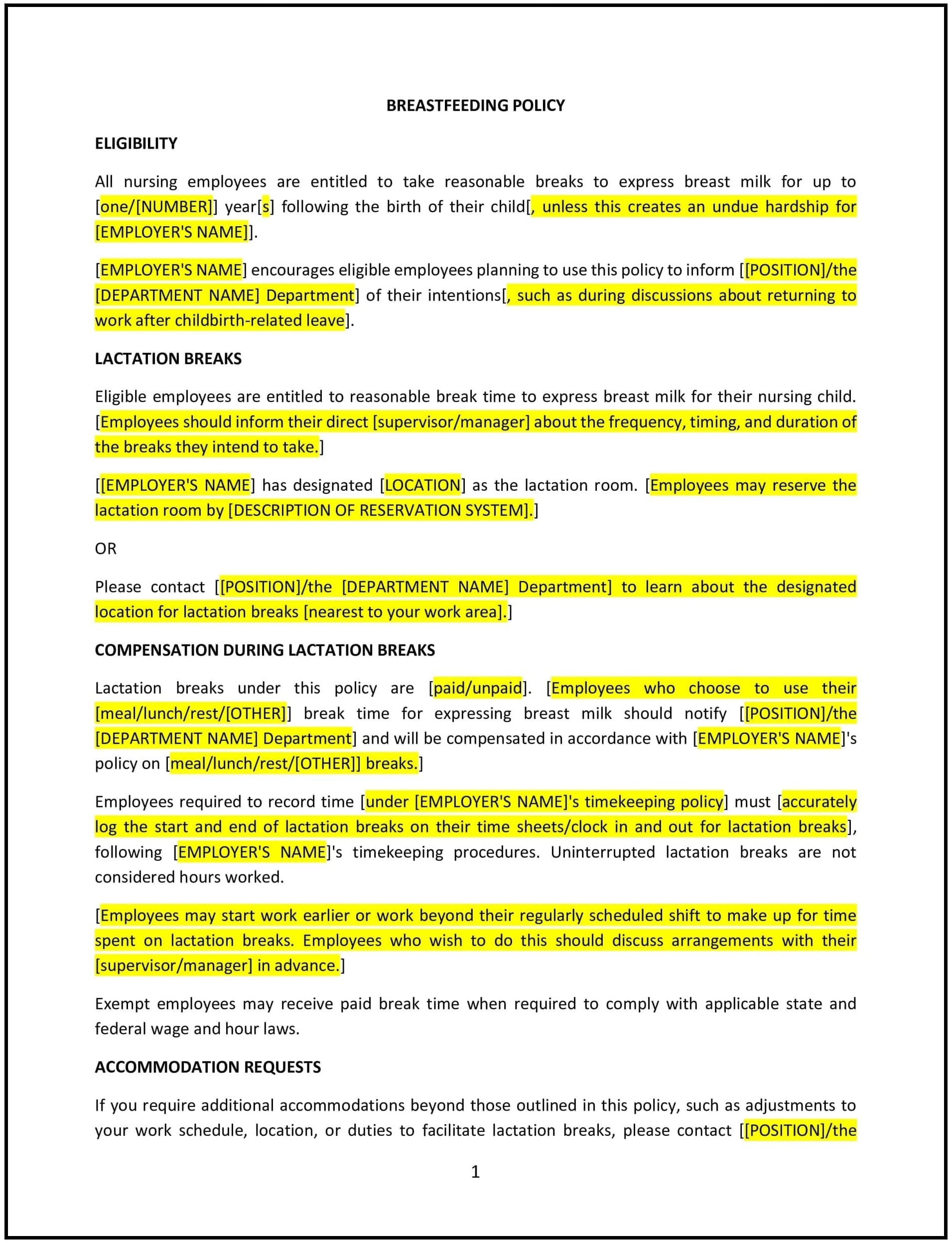Got contracts to review? While you're here for policies, let Cobrief make contract review effortless—start your free review now.

Customize this template for free
Breastfeeding break policy (Nevada)
This breastfeeding break policy is designed to help Nevada businesses provide appropriate accommodations for employees who are breastfeeding. This policy ensures that employees have the time and space to express breast milk during work hours, in compliance with Nevada state laws and the federal Fair Labor Standards Act (FLSA).
By adopting this policy, businesses can support breastfeeding employees, promote health and wellness, and demonstrate a commitment to family-friendly workplace practices.
How to use this breastfeeding break policy (Nevada)
- Define the purpose of the policy: Clearly state that the purpose of the policy is to support breastfeeding employees by providing time and space to express breast milk during working hours.
- Provide appropriate break times: Specify the number and length of breastfeeding breaks employees are entitled to, considering both the needs of the employee and the operational needs of the business.
- Designate a private space: Identify a clean, private, and comfortable space where employees can express milk, ensuring it is not a restroom and is free from interruption.
- Address reasonable accommodations: Ensure that employees are allowed to take breaks to express milk for a reasonable duration, and that they are not penalized for doing so.
- Set guidelines for notice: Provide a process for employees to notify their supervisor in advance when they need to take breastfeeding breaks, ensuring proper planning and minimal disruption to operations.
- Clarify compensation: State whether breastfeeding breaks are paid or unpaid, consistent with Nevada state law and company policies, and clarify how this time will be handled.
- Include flexibility: Recognize that breastfeeding needs may change over time and offer flexibility in break times or the space provided to accommodate employees' needs.
Benefits of using this breastfeeding break policy (Nevada)
This policy provides several key benefits for Nevada businesses:
- Promotes employee well-being: Supports the health of both the employee and their child by enabling the continuation of breastfeeding after returning to work.
- Enhances workplace satisfaction: Shows that the company values work-life balance, which can lead to improved employee morale and retention.
- Supports compliance: Helps ensure compliance with Nevada state laws and federal requirements regarding breastfeeding accommodations in the workplace.
- Demonstrates inclusivity: Promotes a family-friendly environment that is inclusive of breastfeeding employees, improving the company’s reputation as a supportive employer.
- Reduces turnover: Providing breastfeeding accommodations can reduce turnover rates by helping employees manage their personal and professional responsibilities.
Tips for using this breastfeeding break policy (Nevada)
- Communicate the policy clearly: Ensure that employees are informed of the breastfeeding break policy during onboarding and through regular reminders.
- Be flexible: Understand that employees may need varying amounts of time and flexibility depending on their breastfeeding schedule and needs.
- Respect privacy: Ensure that the designated space for breastfeeding is private, clean, and comfortable, and that employees can express milk without fear of interruption or judgment.
- Track break times fairly: Ensure that break times for breastfeeding are tracked in a way that is fair to all employees, in line with company policies.
- Review the policy regularly: Update the policy as necessary to ensure it remains in compliance with Nevada laws and company practices and reflects the needs of breastfeeding employees.